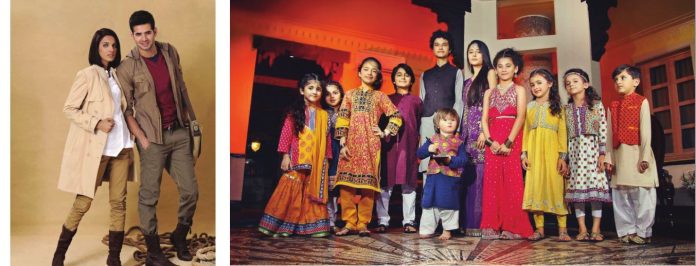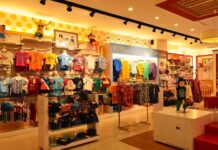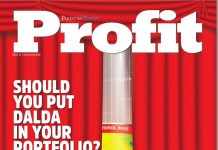
Established as a manufacturing and retailing unit some 32 years ago, in 1985 to be precise, Sefam started with embroidered fabrics made in pakistan. The first brand for the company was Bareeze, followed by eleven more: Leisure Club, Minnie Minors, Chinyere, Bareeze Home Expressions, Kayseria, Urban Culture, The Working Woman, Bareeze Man, Rang Ja, Shahnameh, and Super Squad. Urban Culture was eventually dropped when the management saw it failing to keep up with the market as well as other brands in the family. All these brands cater to the target market of socio-economic classes (SEC) B+ and upwards. They are catering to international market through online sales, and are also operating in GCC through Sehas LLC.
The Senior General Manager of the company Omer Chaudhry is directly heading operations responsibilities of two of these brands: Shahnameh and Leisure Club (LC). Kayseria and The Working Woman are also being operated from the same headquarters where Omer sits and manages his two brands. Profit sat with Omer to discuss the 40 years of apparel retail industry in Pakistan, and LC’s effort with its tagline “Made of Pakistan.”
At best a slowdown
Apparel retail industry in Pakistan is in a fix, with many renowned brands including Khaadi and Nishat Linen agreeing that increased operational costs and cut-throat competition are the prime reasons for it. To Omer, however, there is not a decline, but a slowdown at best, and that too for different reasons entirely.
“The millennials are a generation that spends, instead of saving their incomes. The previous generations used to spend as needed, meaning that if they bought clothes on sale it was for the rest of the year. The present generation wants experience along with the product, so they can share it with others. The ones who failed on the experience-front are losing out. The brands have to adapt with as much speed as changes in consumer behavior. Keeping up with the market and the pace with which you adjust to the market is known as ingenuity and that’s one of our values, in addition to quality, compassion, and integrity.”
Omer, however, conceded that competition has made it challenging to operate in the market. “The number of brands making an entry every year is more than the new customers entering the market. Almost all textile houses want to get their name out there and many try to do that through launching a clothing brand. Hence the fight for the acquisition of the same consumer and increasing brand competition is also a reason for many brands experiencing a growth slowdown.”
The Culture of sales and discounts coupled with higher operational & rental costs is eroding margins for all players out there, making it interesting and tough.
One recent event highlights the stresses this new paradigm has put on all the retailers. Retailers, operating in a prominent mall, lodged a collective protest against skyrocketing operating expenses with the mall management. Omer said, it was, in fact, a great sign for Pakistan’s retail industry, regardless of the circumstances that brought it about. “This is the first time that big and small retailers have united to argue their case. This unity is very important, as local retailers have not been this organized ever before. This is a good sign, the retailers are moving together in the right direction irrespective of their size or market share.”
However, he takes the argument of malls experiencing low footfall with a pinch of salt. “Packages has lower customer inflow than Emporium for our outlets, but the measurement of total footfall is not something that we account for. There are several agencies providing the service of counting the footfall: while some measure it through the heat sensors, others go for the persons passing through movement sensors and so on. Each of these has its own challenges, for instance, the movement sensors version has to be divided by two since everybody going in will also come out, the biggest issue being the staff movement. At malls, the shops have lots of employees, and it represents a considerable number already having been accounted for from the staff and not from customers.”

Changing perceptions
The government, he says, needs to go softer if they really want to see the retail industry grow. “The government saw the growth and their first reaction was to slam it with taxes. That’s one area where government can assist by providing rebates or incentives. If the government facilitates retailers, this industry can grow massively.”
To him, political instability and general uncertainty in the country is another major factor holding the retail industry back. “Massive growth comes from a huge influx of customers, and the way to do that is through tourism. Pakistan has all the right sights and sounds to become a sought after tourist destination, all we need is improved country branding.
“Things are bad in other countries as well. If you go to Barcelona, for instance, the first thing you get is a travel warning, saying beware of pickpockets, don’t go into this alley, don’t do this, don’t do that or you’ll be in danger etc. Pakistan is comparatively much safer and it is a fantastic market, but we need to cultivate that right external image. This is why the logo for LC promotes, Made Of Pakistan.”

Elaborating on this seemingly incorrectly phrased tagline, Omer said, “It probably appears to you as a grammatical error but that is why it will stay in your mind. We want to project that we are the sons and daughters of Pakistan. Made in Pakistan would just mean manufactured in Pakistan but Made of Pakistan means that it is Pakistani by all means.”
Pointing to Pakistan’s flag badge on his coat, he added, “People in our office wear this badge throughout, especially when we are traveling. When I am abroad, people ask, why am I wearing this badge and I tell them that because I am an ambassador for my country. When you are out there and you talk to people with pride and dignity and own your identity, it becomes an icebreaker, and helps you change their perception of your country.”
“We as a company have invited many people over from other countries just to change their perceptions – not as tourists but just as guests on a wedding function. Across the world, there is a travel advisory and many countries don’t provide travel insurance to come to this part of the world. We invited them, telling them, they are our responsibility. We – The people of Pakistan are extremely hospitable. We open our doors and hearts, and they get to see how different the people are from the image they have been fed through media Richness and generosity is our culture and they definitely get impressed.
“Things are changing slowly and gradually now and that is what we require.”

Bareeze, still the top performer
Moving on to the brands under him as the CEO, he shared that Bareeze is the highest performing brand of the group, with year-on-year growth nearing 15-20%. “There is obviously a generation gap but people still are buying it; even if you can’t see it in the shops, it does not mean that the brand is not doing well. Compared to other brands, the growth for Bareeze is astronomical.” He added, “To ensure that all brands maintain a competitive edge, Sefam’s executives won’t hesitate to make the hard decision of scrapping low-performance brands as they did Urban Culture in 2016.”
Many of SEFAM’s brands overlap in different age groups and compete with each other. “It is deliberate. Our company decided that we will come up with brands that at any given time compete against each other, and they all improve and grow because of it.

“Already there are many competitors, so one more competing to make you better is not the reason for us to duck away from that. Every brand has its separate profit and loss account, they have totally different operational fields and we treat them as completely different entities.” However, to maintain all brands at par, SEFAM sometimes drops low-performing ones, or merge different categories within brands. According to Omer, it is done to keep the brand life cycles ‘in the now’.
Coded in the DNA: Playing by the rules
Talking about the competition he said, “Outfitters, Breakout and a few others are competitors for Leisure Club. But there is no other brand with as much philosophy and building up of a brand behind it. Leisure Club started 21 years ago and it was based on the ideology of family’s fashion destination. It started off as a brand for children but then it kept growing and things started becoming complex. Brand traction matters a lot. The older ones always have a higher trust and more strength. People started building their brands around LC’s ideology, but no one else has the matching measure of maturity.”
“We keep our people very informed about the changes in prices, taxes, and other matters. It is our policy to maintain that trust. In Bareeze, we informed our customers when the taxes were increased and when these were eventually reversed, we sent text messages to our customers, asking them to take that money back. We have employees who know generations of the same customers. I cannot claim that whole hundred percent of the people would have gotten the payments back but that is how we strive to pay back our patrons. At our end, the intent was to repay each and every customer.”
This policy of keeping the customer trust has allowed the company to grow massively. “When we started Bareeze we came across a major issue of dyeing clothes. We had a lot of fabric and we decided to start our own facility to provide that service as well, and that facility, Sarena Dyeing & Finishing is one of the most sought-after companies.”

“We also pay taxes in full. People sometimes tell us that it is stupid but this is coded in our DNA. We play by the rules irrespective of what others do or say, and it pays off. We are promising quality and when the customers know that they are going to get their money’s worth they are okay even with higher prices.” It is one of the major reasons for customer loyalty as well. If the product is only floated at prices, any competitor with slightly lower prices can take the customers away, but if there is an entire experience and trust associated with the brand, people prefer to continue buying the product instead of falling for lower prices.
Building international trust, reputation
Another benefit accrued to SEFAM from their customer-oriented practices is international brand’s trust in them. Currently, SEFAM operates as the sole representatives for three international brands in Pakistan, namely Entertainer, Polo Ralph Lauren, and Armani. “These people also come to you after doing a thorough research on your market and your business philosophy. So by being good and honest here, we have also built an international reputation for ourselves.” Speaking about positioning his own brands to the competition posed by these international brands, Omer said, “We learn from them. We constantly try to make ourselves better instead of shying away.”
Speaking about the new ventures introduced by SEFAM, and LC, in particular, Omer said, “We at harness and amplify local talent, may it be dressing up Pakistan Women’s Cricket team, Pakistan Polo Team or women footballers, as well as leading through Vote for Pakistan campaign for national interest.”
Wearing Pakistan on its sleeve
The Leisure Club continues to wear it’s being a Pakistani brand on its sleeve. “While marketing ourselves, we always try to project Pakistan. Once we had a major sale so we called it Wehshi sale and we had Sultan Rahi in the promotional posters, with a gandaasa and everything related to that image. On Eid Al Azha, we used a bakra in our posters with the slogan, “Eid Mubaaaaarak. In a market which loves taking foreign models and landscapes, we promote our heritage sites and stay 100% Pakistani with our models.”
About Shahnameh, the second brand under his direct management, he said, “We have a separate outlet for it in Karachi, but in Lahore, we showcase it in shop-n-shop. It’s only 5 years old, so it cannot be compared to Leisure Club. The energy of a young brand and an old one are very different.” To him, as of now, Shahnameh does not have any competition either. But he believes that it has more independence to play with its image, unlike LC – an old and mature brand that cannot suddenly shift its path or market direction.

Concluding on LC’s focus on Pakistan once again, Omer said, the campaign – ‘Clothing a Million Smiles’ – is ongoing perennially with a dedicated basket placed in every outlet for customers to drop-off clothes for charity. The used clothes are washed, sterilized, rebranded, packed and labeled according to gender and age groups and then distributed, through communities or dedicated and recognized charities.
“We are a very giving nation, Some people actually buy new clothes and drop them in those baskets because they trust us that these will be delivered to the deserving out there. We are trying to play our part in making Pakistan locally cherished and globally loved.”





